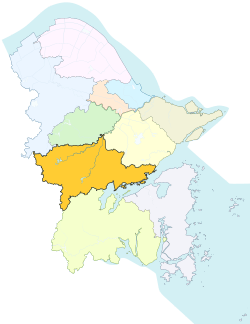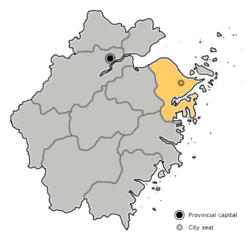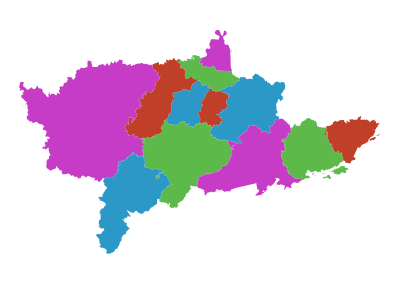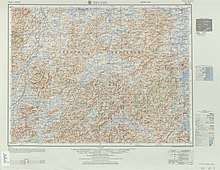Fenghua District
![]()
Fenghua 奉化区 Fenghwa | |
|---|---|
 Wenchang Pavilion in Xikou | |
 Fenghua in Ningbo | |
 Ningbo in Zhejiang | |
| Coordinates: 29°39′N 121°25′E | |
| Country | People's Republic of China |
| Province | Zhejiang |
| Sub-provincial city | Ningbo |
| Township-level divisions | 12 (6 towns, 6 townships) |
| Government | |
| • Mayor | Gao Haomeng |
| Area | |
| • Total | 12,549 km2 (4,845 sq mi) |
| Population | |
| • Total | 490,000 |
| • Density | 39/km2 (100/sq mi) |
| Time zone | UTC+8 (China Standard) |
| Postal code | 315500 |
| Area code(s) | 0574 |
| Website | www.FH.gov.cn |
| Fenghua District | |||||||||
|---|---|---|---|---|---|---|---|---|---|
| Chinese | 奉化 | ||||||||
| Postal | Fenghwa | ||||||||
| |||||||||
Fenghua is most famous for being the hometown of Generalissimo and President Chiang Kai-shek. Geographically, it is dominated by the Tiantai and Siming mountain ranges.
History
Fenghua was established as a county in the Tang dynasty, in the territory of Mingzhou. Its name means "Accepting Reform" and adopted during imperial times. During the Song dynasty, immigration from the north increased exponentially, peaking during the loss of northern China to the Jurchen Jin dynasty during the Jin–Song wars. In 1129, Fenghua was raided by Jurchen cavalry in pursuit of Emperor Gaozong. Local militia at Xiaowangmiao (蕭王廟) fought off the invaders.
In late imperial times, Fenghua established itself as a meeting point for trade between the agrarian communities to the north, in Yinxian (鄞县), and the mountain-based communities in the south. In exchange for grain and cereals, the hill peoples would trade bamboo, timber and other cash crops such as tea and tobacco. In the east of Fenghua, around Xiangshan (象山), there existed also a number of fishing communities.
As with the rest of China, the 19th century brought about tumultuous changes. The Opium Wars with Britain devastated the economies of the coast. Around this time, many Fenghua men sought opportunity in the rising cities of Harbin, Weihaiwei and Shanghai. They later became famous in the 1920s for their dominance of the tailoring profession in downtown Shanghai, known as the "Feng Bang" (奉幫). But by far Fenghua's most famous son was Generalissimo Chiang Kai-shek, Chairman and later Director-General of the Kuomintang (KMT) (1926-1927, 1936-1975) and President of the Republic of China (1948-1975). Chiang's family were originally salt merchants in the township of Xikou old pronunciation "Qikou"), a town in the west of Fenghua district.
Administrative divisions
 Fenghua District administrative divisions map Dayan
Fangqiao
Jiangkou
Jinping
Yuelin
Shangtian
Xiwu
Chunhu
Qiucun
Song'ao
|

Fenghua has 6 subdistricts and 6 towns.[1][2][3][4][5][6]
Six subdistricts:
- Jinping (锦屏街道)
- Yuelin (岳林街道)
- Jiangkou (Chiang-k’ou-chen; 江口街道, formerly 江口鎮)
- Xiwu (Hsi-wu-chen; 西坞街道, formerly 西塢鎮)
- Xiaowangmiao (Hsiao-wang-miao-shih; 萧王庙街道, formerly 蕭王庙市)
- Fangqiao (Fang-ch’iao-chen; 方桥街道), established in January 2019
Six towns:
Economy
Today, Fenghua is a centre for light manufacturing and small scale farming. It boasts a number of premier garment and textiles factories, including the Romon brand widely recognised in China. It is also home to the vast industrial facilities of Ningbo Bird, a leading Chinese mobile phone manufacturer. As the port city of Ningbo is further integrated into the burgeoning economic region of Shanghai, Fenghua will attract increased foreign investment and continue to grow.
In 2008, the district's gross domestic product was RMB 18.8 billion (per capita RMB 39,100), an increase of 8.1% from the previous year.
Tourism
Largely as a result of Chiang's fame, Fenghua attracts a large number of tourists. Aside from Chiang's former residence and related nostalgia, Fenghua has relatively few relics from the past. The great Xuedou Temple (雪竇寺), once one of the ten great monasteries of Chan Buddhism, was destroyed during the Cultural Revolution. Other sites, along with numerous local shrines, clan halls and genealogies, also perished in those chaotic years.
To encourage the growing tourist trade, Fenghua municipality has made efforts to preserve remaining items of cultural interest. In 1988, for example, it rebuilt Xuedou Temple and also restored the Temple of King Xiao at Xiaowangmiao.
References
- "Administrative Divisions". 宁波市奉化区人民政府 English. Retrieved 29 September 2019.
Fenghua’s total land area covers 1,249 sqkm, its sea area covres 96 sqkm, governing 6 towns and 5 residential districts, with a population of 490,000.
- 2018年统计用区划代码和城乡划分代码:奉化区 [2018 Statistical Area Numbers and Rural-Urban Area Numbers: Fenghua District] (in Chinese). National Bureau of Statistics of the People's Republic of China. 2018. Retrieved 29 September 2019.
统计用区划代码 名称 330213001000 锦屏街道 330213002000 岳林街道 330213003000 江口街道 330213004000 西坞街道 330213005000 萧王庙街道 330213100000 溪口镇 330213103000 尚田镇 330213104000 莼湖镇 330213106000 裘村镇 330213107000 大堰镇 330213108000 松岙镇
- 奉化市历史沿革 [Fenghua City Historical Development] (in Chinese). XZQH.org. 10 October 2016. Retrieved 29 September 2019.
2010年末,奉化市面积1268平方千米,人口48.2万人,辖5个街道、6个镇、21个社区、15个居民区、355个行政村。
- 行政区划. 宁波市奉化区人民政府 (in Chinese). Retrieved 29 September 2019.
2003年12月,江口镇、西坞镇和萧王庙镇改为街道。全市设6镇5街道。 2019年1月,新成立方桥街道。全区设6镇6街道
- 宁波市奉化区政区图. 宁波市奉化区人民政府 (in Chinese). July 2018. Retrieved 29 September 2019.
- 奉化市政府网站报送情况. 宁波市人民政府 政府站 (in Chinese). 10 September 2015. Retrieved 30 September 2019.
松岙镇政府 http://songao.fhnews.com.cn 永久关停 {...} 奉化大堰 http://dayan.fhnews.com.cn 永久关停 {...} 奉化·莼湖镇 http://chunhu.fhnews.com.cn 永久关停 奉化尚田镇 http://shangtian.fhnews.com.cn 永久关停 奉化新闻网岳林站 http://yuelin.fhnews.com.cn 永久关停 奉化新闻网—锦屏站 http://jinping.fhnews.com.cn 永久关停{...}奉化萧王庙街道 http://xwm.fhnews.com.cn 永久关停 奉化市江口街道办事处 http://www.fhjk.gov.cn 永久关停 奉化新闻网-西坞街道 http://xiwu.fhnews.com.cn 永久关停{...}奉化新闻网-裘村站 http://qiucun.fhnews.com.cn 永久关停
- "Crop doctors are busy serving farmers". 宁波市奉化区人民政府 English. 31 May 2019. Retrieved 30 September 2019.
For two consecutive days in May 29th, 3 Farm doctors at the District Central Farm Hospital came to the field of Li Feng, a large grain farmer in Song Ao town.
- 现代汉语规范词典(第3版) [Xiandai Hanyu Guifan Cidian (Third Edition)]. 北京. Beijing: 外语教学与研究出版社. Foreign Language Teaching and Research Press. May 2014. p. 13. ISBN 978-7-513-54562-4.
岙 ào 名 指山间平地(多用于地名)▻松~ 霓~ (均在浙江)。
External links
| Wikimedia Commons has media related to Fenghua District. |